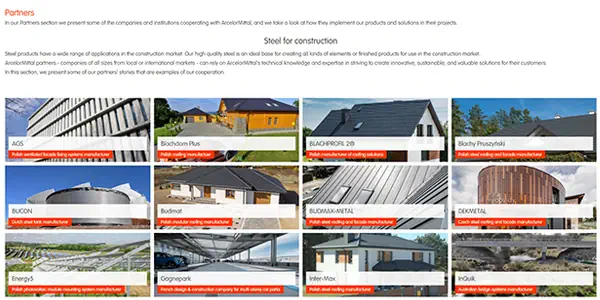More case studies with Sheet piles
M25 London Orbital Motorway extension with ArcelorMittal steel sheet piles
As the M25, The Orbital Motorway around the British capital, had been dealing with a large increase in traffic, the decision was taken in 2009 to add a fourth lane to the section northwest of London. ArcelorMittal sheet piles were used for the permanent retaining wall along the motorway.
Detailed information
The M25 is an extremely busy motorway around London. It constitutes just 6% of Britain’s motorways, but carries 15% of its traffic. To alleviate the resulting congestion in the north west quadrant where key arterial motorways, such as the M40, M1, and A1(M) feed into the M25, The Highways Agency requested tenders for the widening of the motorway in these critical areas. On 20 May 2009, the “Connect Plus Consortium” was awarded the £6.2 billion Design Build Finance and Operate (DBFO) contract.
Section 1 (junctions 16 – 23) of the widening was broken into three sections of approximately 7.5 miles each with much of the work being in cut and with many overbridges. Adding a fourth lane quickly and efficiently whilst minimising disruption for road users and maximising staff and user safety during and after construction presented no small challenge. Since much of the existing motorway is in cut with quite steep embankments leading down to the hard shoulder, constructing an extra lane required permanent retaining walls and regrading of the embankments.
Steel sheet piles chosen as the most efficient solution
The project manager analysed several construction methods. The reduced construction programme offered by steel sheet piling was the winning factor.
The site investigation indicated hard driving with stiff clays. Balfour Beatty specified a staggered combination of piles called the King Sheet Pile (KSP) system, for which a patent has been applied for. KSP uses a heavy pair of AZ sheet piles in long lengths interspaced with shorter and lighter AZ piles. This retaining wall system offers the advantage that not all of the piles have to be driven into the harder strata which facilitates faster installation.
The KSP system presented the subcontractor with the logistical challenge of ensuring that five piling rigs were constantly supplied with the correct mix of sections and lengths, but they were able to call off the materials wall by wall which greatly simplified the logistics.
ArcelorMittal steel sheet piles
The chosen sheet piles were the ArcelorMittal AZ ranges (including AZ 12-770 to AZ 37-700 and AZ 13 – AZ 48) acting in cantilever with some retained heights over 5 m. Many of the initially “soft” structures have been converted to AZ piles to benefit from much faster construction speeds. Sheet piling installation proved not to be affected by the winter weather whereas other materials may well have been delayed by the heavy rain followed by freezing conditions that summarise this typical English season.
The joint venture employed three ABI Leader Rigs with MRZV-V vibrodrivers and one Bauer Leader Rig with MR 125 V vibrodriver. Installation was faster than expected. The original programme was for the first 22 000 m2 to be driven in 40 rig weeks, but it was achieved in only 28 rig weeks. Peak production of 1375 m2 in a five-day week was achieved, which tested the logistics chain. The first batch of AZ sheet piles was ordered in loose pairs, but for even faster installation later orders were for crimped pairs.
Excellent planning before commencement, optimal efficiency of design using the AZ range of sheet piles from ArcelorMittal, and the very professional execution of the piling installation combined to ensure this project was a total success for all involved.
Project information
- London
- United Kingdom
- Engineering office:
Atkins Ltd - Contractors:
Connect Plus, Consortium Balfour Beatty / Skanska /
Atkins / Egis Road Operation UK
Subcontractors: Kim Barker Construction / Commercial Marine & Piling Joint Venture (KBC/CMP JV) - Client:
Highways Agency UK - Text & Photos:
ArcelorMittal Sheet Piling

























